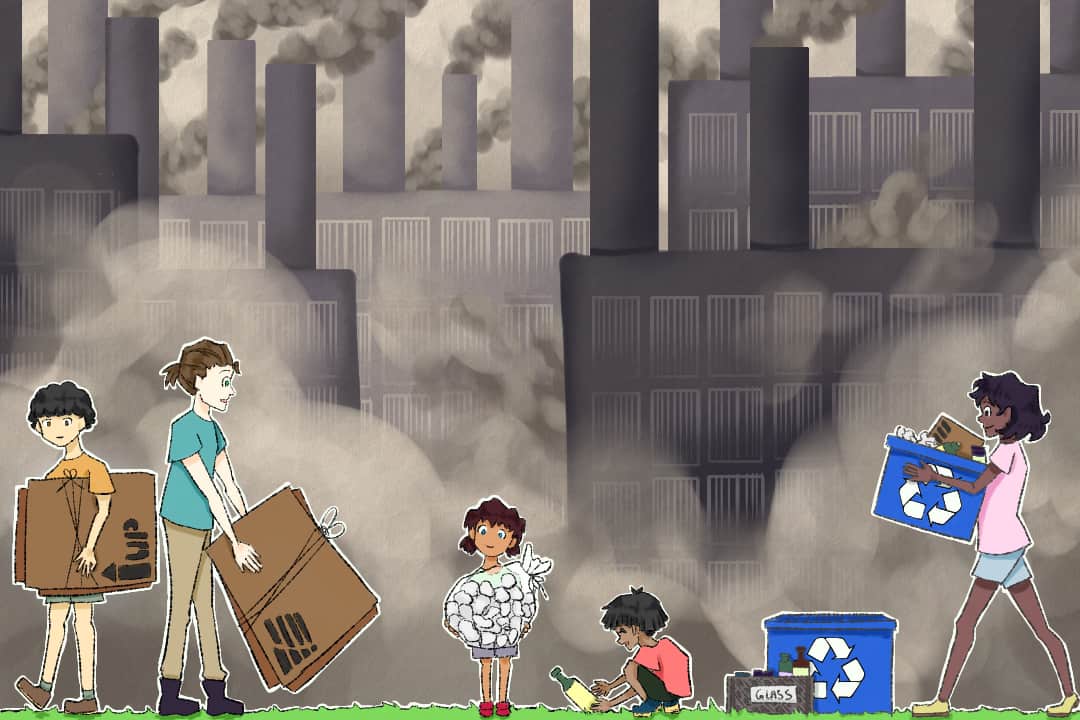We live in the age of the Anthropocene. We have successfully pushed the Earth into a new geological epoch, where humans affect the planet more than all its natural systems combined.
Such a sweeping statement is quite compelling. I’ll be the first to admit that I’ve often referred to the term “Anthropocene” without much questioning — it seems like the perfect term to encapsulate the impact of humans on the planet, and it rightfully puts responsibility in the hands of humanity.
In a time where finding solutions to the climate crisis is a top priority, using the term Anthropocene is valuable because it emphasizes humanity’s role in the ever increasing issue of the climate crisis. However, problems in how we use this term still exist.
How did the Anthropocene come about?
Meteorologist and chemist Paul Crutzen coined the term Anthropocene in 2000 to define the “Age of Man.” An epoch refers to a specific distinctive period of time and geographical epochs are distinguished by major geographical changes to Earth. Our current epoch, the Holocene, began 11,700 years ago, following the last glacial ice age.
Proponents of the Anthropocene suggest a distinction is needed between the Holocene and the current time period in which human activity has become a significant shaping force for the environment, altering many of the planet’s systems and ecosystems at an unprecedented rate. Natural warming cycles have accelerated, stores of resources have dwindled, and rates of extinction have skyrocketed. In just 200,000 years, humans have guided the planet toward a new trajectory because of agriculture, pollution, deforestation, and urbanization.
It’s hard to disagree with the significance of human activity. However, epochs are officially classified based on changes in the Earth’s rock layers — so the question for stratigraphers, and the International Union of Geological Sciences (IUGS), one of the world’s largest geoscience organizations, is whether humans have altered the planet enough that there would be a noticeable change in rock strata. If approved, the effects of consumption and urbanization would become officially codified into the Earth’s geologic history.
Limitations of the term
The term Anthropocene asserts that the whole of humanity has altered the planet’s natural systems. However, it is companies — not individuals — that are driving the bulk of the climate crisis. While consumption habits and individual actions do contribute to the planet’s overall ecological footprint, claiming that these are comparable to the actions of the world’s major companies is flawed.
100 companies have been found responsible for more than 70 per cent of global greenhouse gas emissions. Since 1988, half of the total global emissions comes from the actions of 25 companies. Among those are major fossil fuel companies such as Chevron, Exxon, BP, and Shell — and when combined, these four companies are to blame for more than 10 per cent of global emissions since 1965.
The climate crisis directly threatens the survival of Tuvalu due to rising sea levels, yet among the world’s nations, Tuvalu has contributed least to the ecocatastrophe — it has a carbon footprint of zero.
Michael Mann, a leading international climate scientist, puts it best: “The great tragedy of the climate crisis is that seven and a half billion people must pay the price — in the form of a degraded planet — so that a couple of dozen polluting interests can continue to make record profits.”
The problem is that the Anthropocene places all humans into a singular category of equal responsibility, while the statistics show otherwise. The victims of the climate crisis, whose homes are threatened by lack of clean water or increasing temperatures, are equated to those in the global North, who release carbon into the atmosphere and continue on the path of urbanization without a second thought.
To classify this epoch as the Anthropocene without addressing disparate levels of responsibility is to allow corporations to avert responsibility yet again, shifting the blame to the human species rather than focusing on the major actors whose actions brought us to this point in the climate crisis.
Moving forward
Using “Anthropocene” as a catch-all term is risky. Without context, it’s easy to slip into the habit of assimilating all of humanity into one responsible party. But while the term is problematic, it can be a useful way to classify the current time period. At no other point in history has a single species had such devastating effects on the environment, and it’s important to recognize this fact.
Nevertheless, continuing to rely on the rhetoric of the Anthropocene doesn’t put us in the best position to address the climate crisis. The most common recommendations are to implement legislation, reduce emissions, and mitigate consequences. It may seem repetitive, but at this point in the crisis, we’re running out of time. Focusing on the environmental impacts of individuals’ activity won’t get us where we need to be. It’s the major actors — the companies — that need to change, and fast.
Perhaps the solution isn’t to erase “Anthropocene” from our vernacular. Instead, we must endeavor to recognize its shortcomings and address areas of improvement for those shortcomings. Whether it’s formally adopted by the IUGS or not, it can be a useful way to refer to this period of human influence — but we must change the way it’s framed to ensure that it recognizes divergent scales of responsibility in the climate crisis.
Chloe MacVicar is a third-year student at University College, studying environmental studies, political science, and writing. She is a climate columnist for The Varsity’s comment section.


